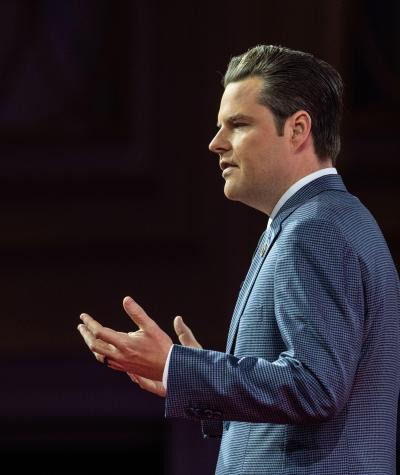After public outcry from elected officials and voters, both liberal and conservative, former Rep. Matt Gaetz withdrew his name from consideration to be nominated attorney general of the United States.
The bipartisan House Ethics Committee was investigating Gaetz for allegations of sexual misconduct and illicit drug use before President-elect Donald Trump nominated him to be attorney general.
This investigation followed one conducted last year by the Department of Justice, which Gaetz would have led as attorney general. Gaetz was ultimately not charged in that investigation.
He resigned from his congressional seat the same day his nomination was announced, and just one day before the House Ethics Committee was set to release its findings.
The attorney general is the country’s chief law enforcement officer, heading the Department of Justice and overseeing its investigations, enforcement actions and prosecutions.
The individuals nominated and confirmed to executive branch positions hold some of the most powerful positions in government and make decisions that affect the daily lives of the entire American public as they implement and enforce the laws Congress passes.
Public outcry has been resounding since Gaetz’s name was announced less than one week ago. In fact, in a recent poll, Gaetz was the only cabinet nominee whose approval rating was underwater.
Public trust in our institutions requires that our federal officeholders avoid conflicts of interest and follow ethical standards.
Without the guardrails secured by ethics laws and regulations, elected and appointed leaders would have free reign to further their personal profits and consolidate power, making decisions that would ultimately harm everyday Americans.
This is far from the first time ethics issues have doomed a cabinet nominee. In 1989, President George H.W. Bush’s nominee for secretary of Defense was rejected by the Senate because of allegations of sexual misconduct and conflicts of interest.
In 1997, a President Bill Clinton nominee withdrew after accusations of sexual misconduct. In 2009, President Obama’s secretary of Commerce nominee withdrew because of a grand jury investigation into potential ethics violations.
Throughout Trump’s first term, three of his cabinet nominees were withdrawn or not formally nominated because of ethical issues, including conflicts of interest.
When nominees are withdrawn or rejected, it’s a sign of the system working; public scrutiny means voters and elected officials can make informed decisions as to whether nominees meet the high ethical standards of the post for which they are nominated.
Gaetz’s withdrawal from consideration in light of the public’s clear concern regarding his alleged ethical violations is proof that a nominee’s conduct still matters.
This withdrawal should not absolve Gaetz from further scrutiny. Indeed, the House Ethics Committee must still release its report on the Gaetz probe. The public has the right to transparency about the conduct of those who have represented them and may still remain a prominent political figure.
Beyond issues directly related to Gaetz, the Ethics Committee should take care to avoid setting a dangerous precedent that any representative under investigation can resign to avoid the release of damaging information.
While every incoming president has the power to nominate individuals who will help the president execute goals the American people elected them to put forth, appointees to the president-elect’s Cabinet should be held to the highest ethical standards that ensure they will work to advance the public interest.
Campaign Legal Center worked tirelessly to hold Trump and his administration accountable amid the numerous ethics violations that defined his first term.
We are prepared to continue that work by bringing the highest level of transparency and accountability to the incoming administration, including calling on the House Ethics Committee to release their report on Matt Gaetz.
To keep up with the ethics concerns of current and future nominees, visit our page.
